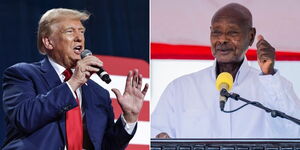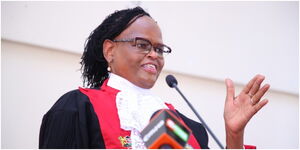President William Ruto has strongly maintained that his predecessor Uhuru Kenyatta's taxation policies are to blame for the current economic challenges.
In a tweet, the Head of State sent out on Sunday morning, Ruto insisted that Uhuru had run down public coffers by reducing the taxes to Gross Domestic Product (GDP) ratio from 20.1 per cent to just 14 per cent.
In comparison, the President shared a graphic that indicated that former President Mwai Kibaki had largely maintained the ratio above 20 per cent, oscillating between 22 per cent and 23 per cent.
"This is where the problem lies," he fired off.
When Kibaki took over the reins for his second term in 2007, he raised the ratio from 22 per cent to 23.1 per cent.
The data, however, showed that Uhuru got a ratio of 20.1 per cent in 2013 and gradually decreased over the 10 years with the biggest steep recorded between 2018 and 2020 from 17.6 per cent to 14 per cent.
Data from the Central Bank indicates that in the 2019/2020 Financial Year, Kenya's real GDP stood at Ksh8.7 trillion compared to Ksh6.6 trillion in 2013. In 2007, the real GDP stood at Ksh1.3 trillion.
Experts, however, reckon that the taxation might have been affected by the rebasing of the tax year twice during Uhuru regime; first in 2014 when the GDP went higher by over 25 per cent and then in 2019 by over 5 per cent.
Meanwhile, the taxation rates remained largely the same.
In an interview with Kenyans.co.ke, however, Professor Fred Ogolla argued that the taxation ratio on GDP is a skewed way to assess a healthy economy.
He argued that whereas GDP shows a growing economy, it does not translate to citizen access to services some of which, may be financed by government commercial services that are not subject to taxation.
"Tax ratio to GDP is a figure he has taken out of convenience. We should be talking more about how the increase in GDP and taxation increases the number of people who are employed, and access to education and health. According to me, tax to GDP is not a figure to measure," he stated.
"Taxation to GDP should measure how much the GDP relies on taxation. How much money you are taking from people? You know, some government services are not taxed but provide revenue to the government."
When Ruto ascended to power, he revealed that he inherited empty coffers and needed to make radical changes to turn around the economy.
"You know what reggae and Building Bridges Team did to our economy? When I took over, there was nothing in the granary, even rats had fled," he told a congregation in Sugoi in December 2023.
"I have since managed to convince our development partners to help us resuscitate it despite criticism from my opponents."
The Head of State, as a result, introduced a raft of new taxes including contributions to the housing levy as well as the Social Health Insurance Fund.
Despite legal hiccups, a plethora of new taxes and contributions are also on the way including an upward revision of the National Hospital Insurance Fund (NSSF) deductions expected to take effect in February.
Meanwhile, Ruto insists that it will take at least two years to turn around the battered economy.












